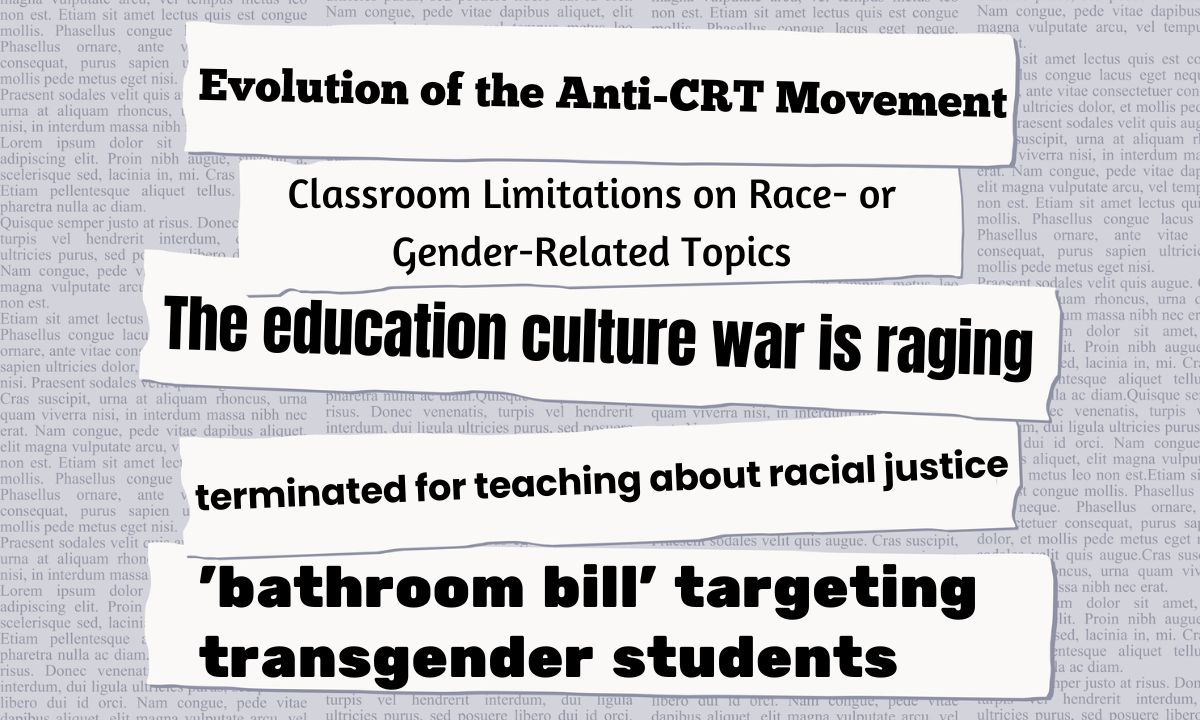5 Strategies to Help Teachers Continue to Educate for Diversity and Democracy
Clark & Pace: Navigating attacks and strengthening curriculum in the face of culture wars and bans on teaching about race, gender and sexuality.

Get stories like this delivered straight to your inbox. Sign up for The 74 Newsletter
As the new school year starts, the media is filled with stories about local and state assaults on teaching about racism, gender and sexuality, as well as the rights of LGBTQ students and teachers. While these threats to public education are deadly serious, educators can confront them with knowledge and forward-thinking strategies instead of succumbing to fearful self-censorship.
Hundreds of bills are pending in 44 states, and laws or executive actions have been passed in 18 states that are intended to restrict or ban teaching about race, racism, gender and sexuality. Virulent attacks have targeted districts, school boards, schools, libraries and individual administrators, teachers and librarians. They are often led by non-parents and outside agitators working for political groups such as Moms for Liberty.
Whether these efforts are understood as the anti-critical race theory movement, conflict campaign or culture wars targeting supposed woke education, the chilling effect on teachers and school leaders is real. Educators are confused about whether their state has passed laws that restrict teaching, what those laws say and how they might be affected by them. They are getting mixed messages as restrictions on teaching contradict the charge to strengthen the teaching of meaningful civics, controversial issues and honest history.
How can educators navigate often unanticipated attacks and strengthen curriculum, teaching and safe spaces that truly benefit all students and a democratic society?
We recommend an approach called contained risk-taking. This involves working toward democratic aims in education while managing the risks of controversy. Teachers and school leaders promote civil discourse about significant issues so students learn how to examine, think critically about and discuss these issues with open minds. The curriculum teaches honest history that includes the experiences of traditionally excluded groups. At the same time, educators use strategies, such as selecting and framing for classroom inquiry and discussion, carefully choosing resources and pedagogical methods, and guiding discussion, to manage the risks that accompany teaching in this political climate.
This framework for reflective practice, derived from a research project on preparing teachers for controversial issues, embodies contained risk taking and encapsulates these strategies. The research examined how four educators at universities in Northern Ireland, England and the Midwestern U.S. prepared teacher candidates for controversy in history, social studies and citizenship classes, and what those student teachers learned and put into practice. The framework is now used by K-12 teachers, school leaders and teacher educators. Here is specific guidance for educators based on five of its elements.
- Prepare Thoroughly: If your state, local government or school district has relevant laws or policies, make sure you read them completely. Also know your state standards and be able to cite them as a guiding document. If your teaching or curriculum is ever challenged, you’ll have the standards, legal text and/or local policies to show that what you are teaching is justifiable. Know your students and school community. Anticipate potential challenges and rehearse your responses to them.
- Communicate Proactively: Keeping open lines of communication with stakeholders, including students, parents and administrators, can head off many potential challenges before they begin. Be transparent about your goals, their educational purposes and the standards they align to, and respond to any concerns before teaching. Collaborate with colleagues and enlist support from school leaders. Turn potential challenges into active parental engagement and address misunderstandings and mischaracterizations of your curriculum directly.
- Choose Resources and Teaching Methods: Use sources and approaches to inquiry and discussion that foster an exchange of ideas among students and develop their media literacy. Discussion formats such as seminars or structured academic controversy, which provide models for exploration of texts and deliberation on issues, are effective at cultivating student voice and evaluation of different perspectives. Be sensitive to which formats are best for different kinds of issues, especially those connected to student identities. Clear goals for the discussion and procedures that keep students focused on those goals help develop vital skills and knowledge while limiting derailing comments from students.
- Cultivate a Supportive Environment: Safe and supportive classrooms and schools make students more open to learning how to engage in civil discourse across differences on significant issues. Take time to develop expectations (with student input), relationships and community. Creating room for students’ opinions and emotions, and pausing if rhetoric becomes potentially harmful or offensive, makes students feel heard and welcome. An open and supportive environment in which students feel they can express themselves and discuss concerns with educators demonstrates caring helps to ward off complaints from students and families and contributes to development of young people’s civic participation.
- Think Through Teacher Stance: Given accusations of indoctrination, educators must reflect on their own perspectives and consciously decide when and how to express them. As moral leaders, they must stand up for human and civil rights. But disclosing views on specific issues requires ethical and practical judgment about the purpose and how those opinions will be received. Individuals react more favorably toward information that aligns with their own beliefs, and educators are no different. Knowing your own perspectives and understanding other viewpoints can help you respond to comments you disagree with in ways that educate and seek common ground rather than alienate people.
We understand the confusion, anxiety and outrage educators are experiencing. We hope these steps will help teachers and school leaders be especially thoughtful, strategic and mutually supportive while they continue to serve the best interests of all young people and a diverse democratic society.
Get stories like these delivered straight to your inbox. Sign up for The 74 Newsletter

;)

